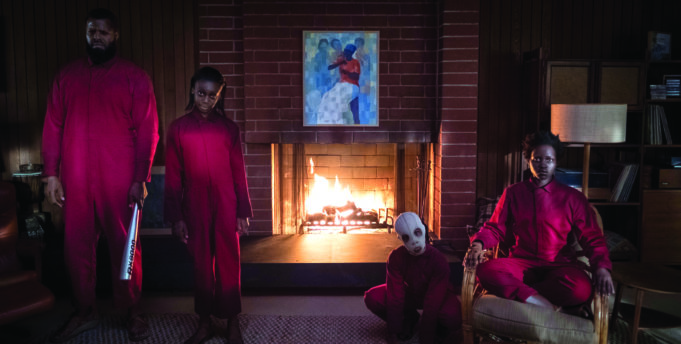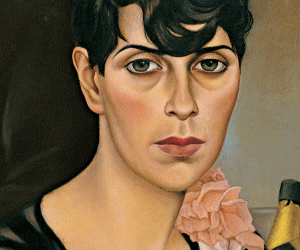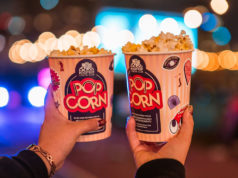The Oscars have taken well-deserved flak for nominating no women for Best Director and only one actor of color out of 20, but as so often happens, they can look at the shambles of the Grammy Awards and say, “At least we’re not that bad.” Practically the only nominees of color this year are the Koreans who worked on Parasite, and don’t expect the mainstream entertainment press to put any pressure on the Academy to change things. Let’s look at the following categories.
Cinematography: The young talent is largely ignored here. Claire Mathon did two extraordinary photography jobs on two wildly different films in Atlantics and Portrait of a Lady on Fire but went unrecognized for both. The same goes for Adam Newport Berra, whose photography of The Last Black Man in San Francisco made the familiar city seem radically new, as well as Radek Ladczuk, whose beautiful and savage look for The Nightingale fit the material well. The camera guys did nominate Jarin Blaschke for his black-and-white look for The Lighthouse, and I’m rooting for him against fellow first-time nominee Lawrence Sher for Joker and Robert Richardson’s fine work in Once Upon a Time … in Hollywood. Still, the winner will likely be Roger Deakins for his technical stuntwork for 1917. I usually pick a bad film that has great cinematography, but I’ve already mentioned Joker.
Production design: When Parasite played at Cannes, a jury filled with experienced film directors thought that the movie had been shot in a real house. The modernist mansion in that film was, in fact, a set designed by Lee Ha-jun and Cho Won-woo. That’s why the Korean film should win this category over admittedly impressive entries 1917 and Once Upon a Time … in Hollywood. There were several other films this past year playing out in awesomely designed houses that merited a nomination: the Victorian style of The Last Black Man in San Francisco, the Gothic one of Knives Out, and the beach houses of Us. Henrik Svensson’s work on Midsommar helped contribute to that film’s feel of a world steeped in ancient rituals. Any of those would have made better nominees than Jojo Rabbit.
Costume design: Black Panther’s win in this category last year was an encouraging sign that this branch’s voters might be willing to consider more than just historical films for the award. If Mark Bridges wins for Joker, that would be even more encouraging. Unfortunately, old habits die hard, which is why this award is probably going to Jacqueline Durran for her subtle work for Little Women or Arianne Phillips for her late ’60s outfits in Once Upon a Time … in Hollywood. (Phillips has been nominated three times and has yet to win.) I’m shocked that Kym Barrett received no recognition for creating the most distinctive movie costume of the year for Us — those dark red jumpsuits immediately call the film to mind. Mitchell Travers’ costumes for Hustlers must have been penalized because they were designed to be taken off. Further afield, Paola Torres made eye-popping clothes for Pain and Glory, and Chen Minzheng’s take on black or white robes and tunics for Shadow made that Chinese film one of the year’s most distinctive-looking. I should also mention Jo Thompson’s work in In Fabric, which offered the unusual challenge of designing a garment that looks like a killer.
Foreign-language International film: The name of this award has changed, and strangely, there isn’t a single dud in the field. Parasite (South Korea) and Pain and Glory (Spain) have both earned major nominations, Honeyland (North Macedonia) is also nominated for the documentary feature award, Les Misérables (France) combines entertainment and social commentary to good effect, and Corpus Christi (Poland) is a solid entry about an ex-convict who poses as a village priest. The field is good but could have been better. Monos (Colombia) would have been a trippy nominee, and Invisible Life (Brazil) is a generational saga that would have satisfied the voters’ epic tastes. Asia could have been more represented by Weathering With You (Japan), Gully Boy (India), or even Furie (Vietnam). The uncategorizable, mystical Atlantics (Senegal) would have been a fine African entry. The French are still arguing over whether Portrait of a Lady on Fire would have been a better nominee than Les Misérables. (The answer is yes.) Still, South Korea looks like a mortal lock to win the statue with its first-ever nomination in this category.
Animated feature: Speaking of Weathering With You, how does that film not merit a nomination here? The same goes for its fellow Japanese movie, Okko’s Inn, and the Chinese entry Ne Zha, either of which would have been a better choice than the defanged Santa Claus origin story Klaus or Laika Animation’s undistinguished Missing Link. The omission of Frozen II is a shock as well, although the unorthodox French tale of a disembodied hand, I Lost My Body, deserves its spot. Try as I might, I can’t find a better animated film from last year than Toy Story 4, and without competition from the other Disney animated hit, it probably takes this trophy.
Documentary feature: Honeyland probably has a better chance of winning here than in the International Film category. For Sama and The Cave are both set in a Syria torn by civil war and will likely split the constituency for films about turmoil abroad. The remaining two nominees are both Netflix films, though American Factory is markedly superior to The Edge of Democracy. You can consult my recent “best documentaries” article to see what I think should have been nominated, but I won’t be upset by a victory for the North Macedonian film.
Original score: Once again, the music branch of the Academy turns out to be the squarest and old-fogiest one. Thomas Newman looks to bag his first win in 17 nominations for 1917 against a field that includes his cousin Randy Newman for Marriage Story, but the one score in the field that truly deserves the statue is the front-runner, Hildur Guðnadóttir’s for Joker. The best score of 2019’s movies was Disasterpeace’s unsettling work for the overly abstruse Under the Silver Lake. Mica Levi contributed similarly disturbing music for Monos, and Bobby Krlic, a.k.a. The Haxan Cloak, rode with the tonal shifts of Midsommar. In a more traditional vein, Emile Mosseri’s string score for The Last Black Man in San Francisco helped give that film its ecstatic vibe. Alex Weston’s classical score for The Farewell matched the film’s restrained style as well.
Original song: The surprising omission of Beyoncé’s “Spirit” from The Lion King means that Elton John and Bernie Taupin probably win this for “I’m Gonna Love Me Again” from Rocketman, beating out “Into the Unknown” from Frozen II. Country music fans should be up in arms over the exclusion of “Glasgow (No Place like Home),” which provided the emotional climax of Wild Rose. The retro-grunge sobriety anthem “Breathe” from Her Smell would have been a worthy nominee, as well as the teen pop number “Wildflowers” from Teen Spirit, co-written by Jack Antonoff and Carly Rae Jepsen. The Academy voters seem to hate teen pop in ways that the nominated musicians probably don’t.












